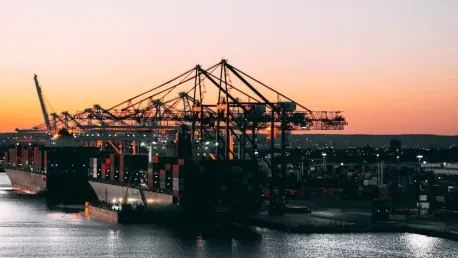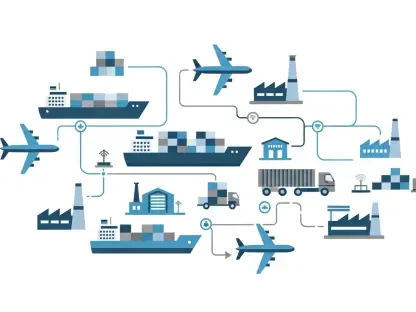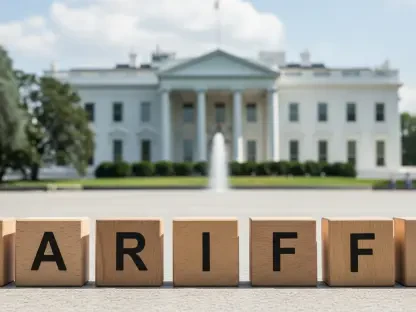The ongoing labor dispute between the British Columbia Maritime Employers Association (BCMEA) and the International Longshore and Warehouse Union (ILWU) Local 514 has led to a significant lockdown of Canada’s western ports. This conflict has caused major disruptions in port operations and affected the handling and movement of various goods. Given the critical role these ports play in global trade, the situation could have far-reaching implications for the global supply chain. With escalating tensions and no resolution in sight, the consequences are likely to be felt well beyond Canada’s borders, even impacting industries worldwide.
The initial spark for this dispute can be traced back to a walkout initiated by union workers at BCMEA member terminals. In response, BCMEA locked out over 700 members of ILWU Local 514 as of November 4th. Despite efforts to mediate, including meetings with the Federal Mediation and Conciliation Service (FMCS) on November 9th, no headway has been made. No further negotiations are on the horizon, leaving the situation at a stalemate.
Initiation and Current State of the Dispute
Negotiations between BCMEA and ILWU Local 514 have been ongoing for nearly two years, ever since the expiration of their previous contract on March 31, 2023. The BCMEA extended what they called a “final offer” on October 30th. This proposal included a 19.2% salary increase spread over four years and an average signing bonus of $21,000. However, this offer has not led to a resolution, leaving both parties at an impasse. The union and employers remain divided on key issues, including wages, working conditions, and other employment terms.
The failure to reach a resolution has resulted in significant disruptions in port operations. Despite the Port of Vancouver remaining technically open, several of its member terminals are inoperative. These disruptions encompass a range of sectors, including automotive, breakbulk, and container operations. Grain shipments, however, have continued without major hitches, and the Westshore coal terminal, along with most petroleum product operations, remains unaffected. The situation has also led to the implementation of rail embargoes, further complicating the transport logistics dependent on these ports.
Impact on Supply Chains
The labor stoppage, while initially expected to have minimal short-term impacts owing to the ability to redirect imports from Vancouver to U.S. West Coast ports, has the potential to cause severe long-term disruptions. According to Marc Iampieri from AlixPartners, prolonged port closures could lead to complications such as equipment shortages, price spikes, and delivery delays, significantly impacting the supply chain if the dispute isn’t resolved promptly. Iampieri highlighted that if the work stoppage persists for several weeks, the ramifications could be profound and widespread.
As of November 6th, there had been no updates to the coast-wide job action involving ILWU Local 514 and BCMEA, resulting in the ongoing disruption of several BCMEA member terminals. Specific sectors including automotive, breakbulk, and container handling have been particularly affected. Although the Port of Vancouver remains operational, various terminals face significant disruptions, causing delays and forcing shippers to search for alternative routes. Nevertheless, some operations, such as grain shipments and petroleum product movements, continue without major issues. However, the imposition of rail embargoes has created additional layers of complexity.
Specific Disruptions at Ports
The Port of Prince Rupert has not escaped the effects of this dispute. Both Fairview Container Terminal, which handles intermodal containers, and Westview Wood Pellet Terminal have been rendered non-operational. This stoppage has had considerable knock-on effects. For example, an operational update from the Port of Prince Rupert on November 8th noted delays in vessel berthing and cessation of container vessel discharges. Rail movements, crucial for inland transportation of goods, have been reduced from an average of 14 trains per day to 12, amplifying the logistical challenges.
Vancouver and Prince Rupert rank among Canada’s busiest ports. Vancouver, for instance, managed nearly as much cargo in 2023 as the next five largest Canadian ports combined. The interruption in port services could severely impact critical exports like potash, essential for fertilizers, with potential revenue losses amounting to $9.7 million per day if the shutdown persists. Furthermore, Vancouver’s role in handling perishable goods imports such as produce, seafood, and dairy underscores the importance of resolving these disruptions quickly to avert broader economic repercussions.
Affected Products and Economic Significance
Various products are likely to feel the brunt of the disruption, as highlighted by Ron Scalzo from FTI Consulting. Products ranging from coal, containerized freight (inclusive of crops and meats), to imported goods like footwear, apparel, auto parts, chemicals, and lumber could all face significant delays. Vancouver holds particular importance for perishables such as produce, seafood, and dairy, making these sectors especially vulnerable to prolonged disruptions.
With North American supply chains still reeling from a recent strike impacting U.S. East and Gulf Coast ports, any redirection of volumes to U.S. West Coast ports like Los Angeles and Seattle to mitigate disruptions from Canada’s western ports could exacerbate existing backlogs. Logistics managers are concerned about the increased dwell times and complications likely to arise from this diversion. This would stretch already thin resources and test the resilience of supply chain networks that are just beginning to recover from previous disruptions.
Mitigation Measures and Recommendations
Experts unanimously agree on the necessity of strategic contingency planning, especially as the holiday season approaches, further amplifying demand pressures. Marc Iampieri advises shippers to evaluate their risk exposure meticulously and invest in alternative suppliers, routes, and essential inventory levels to safeguard against prolonged disruptions. Maintaining diverse supply bases and coordinating closely with suppliers, customers, and freight forwarders are pivotal steps for mitigating the impact of these port disruptions effectively.
Immediate strategies to counteract the current disruptions include utilizing alternative routes and accelerating some purchases to ensure an adequate supply is on hand. Close coordination between suppliers and customers is key to reducing the negative effects during such disruptions. Effective communication and agile management can help address immediate shortages and prevent a longer-term crisis from developing.
Forward-Thinking Investments
The ongoing labor dispute between the British Columbia Maritime Employers Association (BCMEA) and the International Longshore and Warehouse Union (ILWU) Local 514 has resulted in a substantial lockdown of Canada’s western ports. This conflict has severely disrupted port activities, impacting the handling and movement of various goods. Given the crucial role these ports play in international trade, the situation could have widespread repercussions for the global supply chain. With rising tensions and no immediate resolution in sight, the effects are expected to be felt beyond Canadian borders, influencing industries around the world.
The origins of this dispute can be traced back to a walkout initiated by union workers at BCMEA member terminals. In retaliation, the BCMEA locked out over 700 ILWU Local 514 members as of November 4th. Despite mediation attempts, including meetings with the Federal Mediation and Conciliation Service (FMCS) on November 9th, no progress has been achieved. With no future negotiations planned, the deadlock continues to persist, leaving the situation unresolved.









